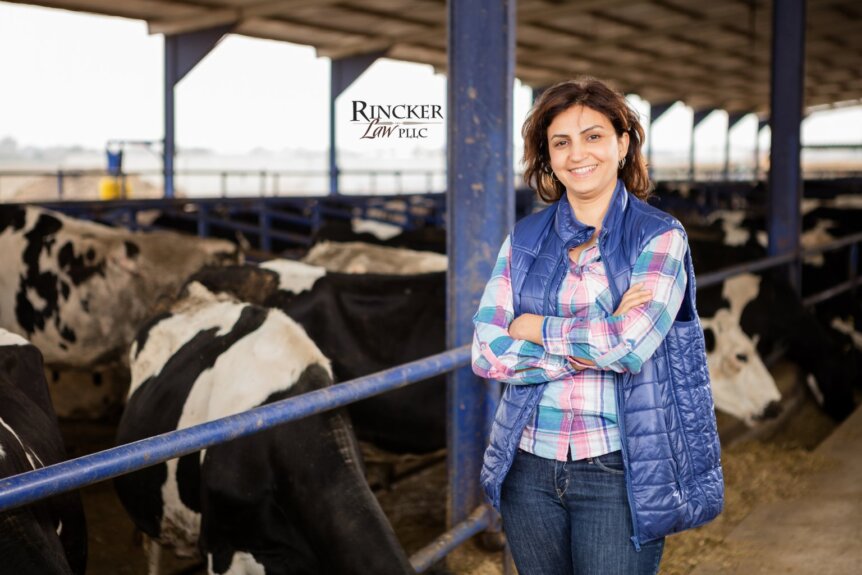Choosing the right legal structure for your farm isn’t just about paperwork, it can affect your taxes, liability, succession planning, and even your eligibility for certain programs. In this article, How to Legally Structure Your Illinois Farm Business for Growth and Protection, we share the pros and cons of common farm business structures in Illinois so you can select the one that best supports your goals.
Why Business Structure Matters for Farmers
The way you set up your farm business determines:
- How much personal liability you have for debts and lawsuits
- How your income is taxed
- How easy it is to transfer ownership to the next generation
- Your ability to raise capital or add partners
- Federal farm program monies with USDA
Many Illinois farmers start as sole proprietors, but as operations expand, that structure may not provide enough protection.
Common Illinois Farm Business Structures
-
Sole Proprietorship
Best for: Very small farms, low-risk operations, or those just starting out.
- Pros:
- Simple and inexpensive to set up
- No separate tax return—farm income is reported on your personal taxes
- Cons:
- No personal liability protection—your home, savings, and other assets are at risk
- Harder to bring on investors or partners
-
Partnership
Best for: Farms owned and operated by two or more people without a corporate structure.
- Pros:
- Easy to form—often by verbal or written agreement
- Pass-through taxation like a sole proprietorship
- May assist with federal farm program planning with USDA
- Cons:
- Each partner is personally liable for the business’s debts and obligations
- Disputes between partners can disrupt operations if there’s no formal partnership agreement
Tip: Always have a written partnership agreement outlining contributions, decision-making, and profit distribution.
- Limited Liability Company (LLC)
Best for: Farmers seeking personal liability protection and flexible management.
- Pros:
- Protects your personal assets from most business debts and lawsuits
- Flexible ownership and management structure
- Pass-through taxation by default, with the option to be taxed as a corporation
- Cons:
- More paperwork and cost than a sole proprietorship or partnership
- Requires an Operating Agreement to clarify ownership and responsibilities
- Requires annual meetings
- May harm some farms with federal farm program planning
-
Corporation (C-Corp or S-Corp)
Best for: Large farming operations or those needing to raise significant capital.
- Pros:
- Strong liability protection for owners (shareholders)
- Easier to transfer ownership via shares
- Potential tax advantages for certain operations
- Cons:
- More complex setup and ongoing reporting requirements
- C-Corps face potential “double taxation” (profits taxed at corporate level and again when distributed as dividends)
- S-Corps have strict ownership rules and limits on shareholders
- May harm some farms with federal farm program planning
-
Cooperative (Co-Op)
Best for: Groups of farmers pooling resources for purchasing, marketing, or distribution.
- Pros:
- Member-owned and operated, with shared benefits
- Can increase bargaining power and reduce costs
- Cons:
- Requires strong governance and member participation
- Profits are distributed based on use, not investment
Factors to Consider Before Choosing a Structure
- Liability Protection – How much risk is your farm exposed to, and do you need to shield personal assets?
- Tax Implications – How will each structure affect your income taxes, deductions, and eligibility for farm tax benefits?
- Succession Planning – How easy will it be to transfer ownership to heirs or business partners?
- Management Style – Do you want a flexible structure (like an LLC) or a formal one with strict governance (like a corporation)?
- Cost & Complexity – Are you prepared to handle more paperwork and filing requirements?
- Federal Farm Program Planning– Does your farm participate in federal farm programs with the U.S. Department of Agriculture?
Illinois-Specific Considerations
- Entity Formation: LLCs and corporations must register with the Illinois Secretary of State and file annual reports.
- Agricultural Programs: Some USDA or Illinois Department of Agriculture programs may have entity-specific eligibility rules.
- Property Tax Assessment: Changes in ownership structure may affect your property tax classification.
- Succession Planning: LLCs often make it easier to transfer ownership interests without changing the farm’s day-to-day operations.
FAQs: Structuring Your Illinois Farm Business
Q: Should I start with a sole proprietorship and switch later?
A: Many farmers do, but it’s best to consider liability risks early. Switching later can have tax and legal implications.
Q: Does an LLC protect my farm from all liability?
A: No. LLCs protect against most business debts and lawsuits, but personal guarantees, certain tax obligations, and illegal actions are still your responsibility.
Q: Can family farms be LLCs or corporations?
A: Yes. Many family farms form LLCs to protect assets and make ownership transfers easier among family members.
Q: Will changing my farm’s structure affect my taxes?
A: It can. Different entities have different tax treatments. Always review with a tax professional before making a change.
Q: How do I decide between an LLC and an S-Corp?
A: It depends on your income, tax strategy, and how you plan to pay yourself. Many farmers form an LLC first and then elect S-Corp taxation if it’s beneficial.
Need Help Structuring Your Illinois Farm for Growth and Protection?
The right business structure can protect your assets, lower your tax burden, and make it easier to pass the farm to the next generation. The wrong one can leave you vulnerable to lawsuits, tax surprises, and ownership disputes.
At Rincker Law PLLC, we help Illinois farmers choose and set up business structures that align with their growth plans and protect their legacy.
Call us today at (217) 774-1373 to schedule a consultation and build a legal foundation that supports your farm’s future.

